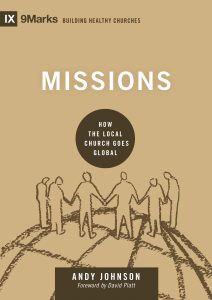
The new book, Missions: How The Local Church Goes Global by Andy Johnson, is a fresh how-to guide for missions because it’s not steeped in pragmatism and what works, but in God’s revelation: the Bible.
The book is unashamedly focused on churches, and therefore could be underwhelming or even disappointing for readers looking for personal guidance on the topic. I know, because I would’ve preferred such a book from the author himself before being sent out as a missionary by his home church, Capitol Hill Baptist Church in Washington, DC.
Now that I’ve fully disclosed that the author of this book is one of my pastors, you may understandably question the credibility of this review. That’s fair. It’s my hope that my presentation is plain enough for you to make your own decision on the value of reading this book. Upon knowing its premise, you’ll be glad to have it on your shelf because what it has to say is simple yet profoundly important: the Bible is our sufficient guide for missions.
Sufficient Guide
This main premise—that the Bible should guide how we do missions—is so huge that it’s worth clarifying. The author isn’t saying the Bible details everything we need to know in order to live and minister in another culture.
Johnson would agree that God has given us common sense and a mind to figure out some of those details, like, for example, how to learn the language in Timbuktu, get a visa for Turkmenistan, or meet people in the megacities of Turkey. By saying the Bible is sufficient, Johnson simply means it “is sufficient to give us the agenda and principles that inform our methods and decisions” (202).
“The Bible is our sufficient guide for missions.”
If you’re like me, then I’m guessing you’d prefer a step-by-step book on missions. We’d prefer for God to drop a banner from the sky that explicitly tells us where to go, what language to learn, and what specific job to take. Reading between the lines of this book, however, makes it clear that Andy believes God doesn’t primarily work this way. After all, this book isn’t about the individual’s role in missions but about the church’s role.
It’s not that individual Christians don’t have distinct roles to play, but rather they primarily fulfill these roles while they serve as members of a local church. Johnson argues that God gave the mission to the church, and therefore we must reorient our thinking as individuals around this paradigm. In his own words, “The church is God’s idea. It is the one and only organizational plan for world missions. Most of all, it is his beloved Son’s beloved, blood-bought bride” (288).
Although the book will likely differ from what some expect in a typical missions book, I believe it’ll profoundly impact how your church leaders and members think about and, therefore, do missions.
Church Leaders
Two types of pastors stand to benefit the most from this book.
The first is the pastor with newfound zeal to get his church involved in missions. He’s convinced that missions is a good thing, and so he desires biblically informed advice on how to create an enduring culture of missions in his church.
 The second type is the pastor whose church is already globally engaged but needs a checkup. This pastor will benefit from evaluating both his own leadership and his church’s zeal through another pastor’s perspective.
The second type is the pastor whose church is already globally engaged but needs a checkup. This pastor will benefit from evaluating both his own leadership and his church’s zeal through another pastor’s perspective.
What doesn’t necessarily come out when reading this book is that the author isn’t speaking from experience of creating a missions culture from scratch—undoubtedly a much easier task—but rather from leading an established congregation in a fairly different direction from the preceding generation. So, know that cultural change can happen.
Even if you don’t agree with every application of this book’s principles, surely you can agree that we all need to evaluate our missions involvement from time to time, much in the same way husbands need to periodically reevaluate their marriage and parenting.
Johnson provides the biblical benchmark for missions—churches planting churches—through which we can evaluate our activities. And then he pastorally helps us distinguish what’s faithful from what’s perhaps just frenzy.
Church Members
Church members will also gain from this book by recognizing that they do influence, for better or worse, how their church is involved in missions. This book gives many principles to help think through how to best use our finite time and resources for missions. Questions like these are important.
- What’s the real purpose of our annual short-term mission trips?
- How do we evaluate supported missionaries on the field?
- How much should we give to them next year?
- Should we support this business project or that orphanage project?
- Should we get involved closer to home or really far from home?
- How long should we support this particular work?
All of these questions will help you evaluate your church’s involvement in missions.
Conclusion
In conclusion, this book will be a great missions counselor because of its biblical premises and practical application. Consider it a much-needed third party speaking into your missions relationships.
At the end of the day, the ultimate question for us isn’t whether something appears to work or not. The more important question is whether we’re being faithful with the time and talents God has entrusted to us. Are we doing God’s mission the way he commissioned it, with the God-given means he’s provided for it, and for the God-given end he intends? Or, to use an English idiom, are we simply doing it by the seat of our pants, using only our own experience and trusting only our own judgment?
Karson Ivy, along with his family, has been serving in Central Asia for the past three years.

